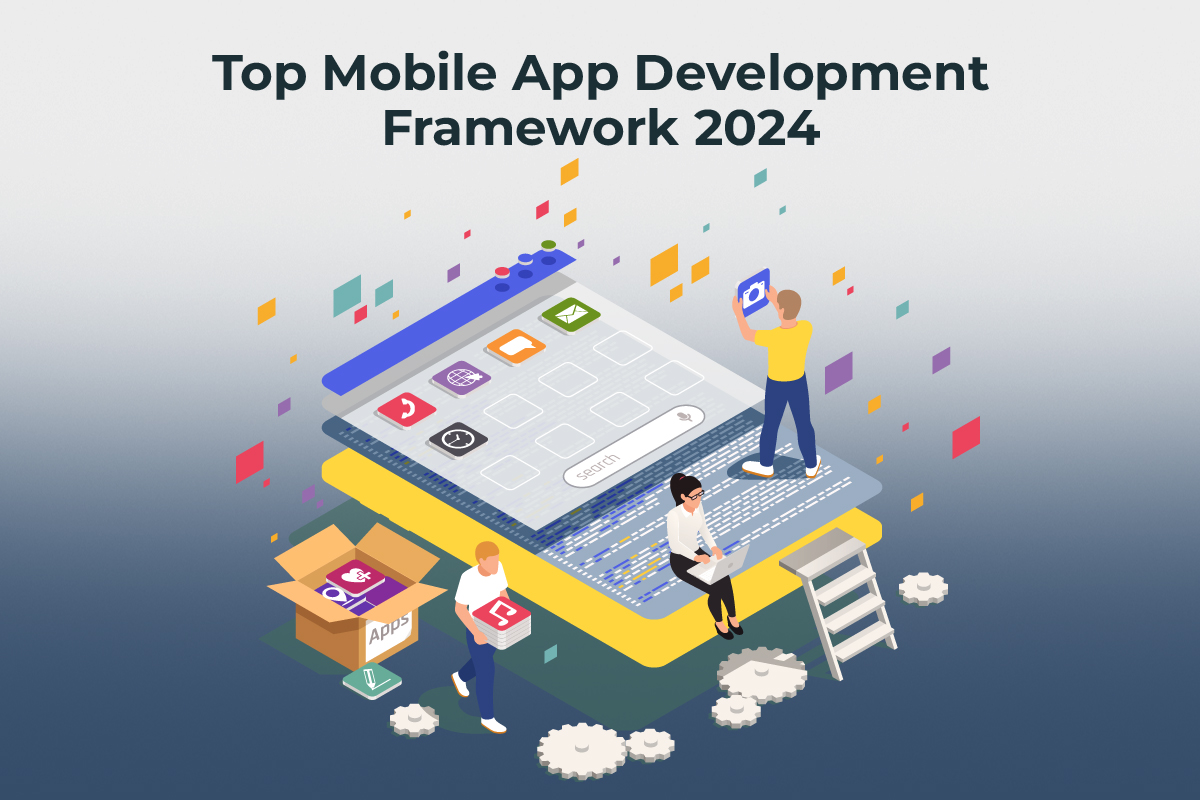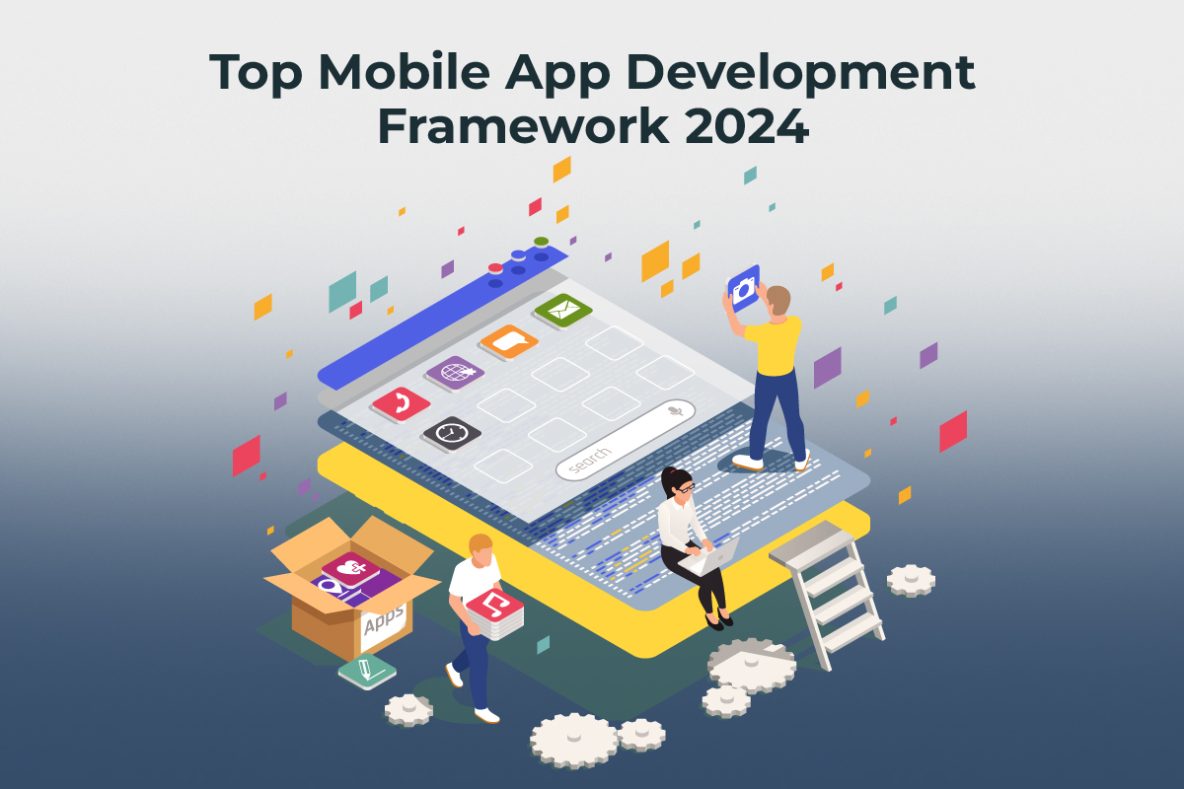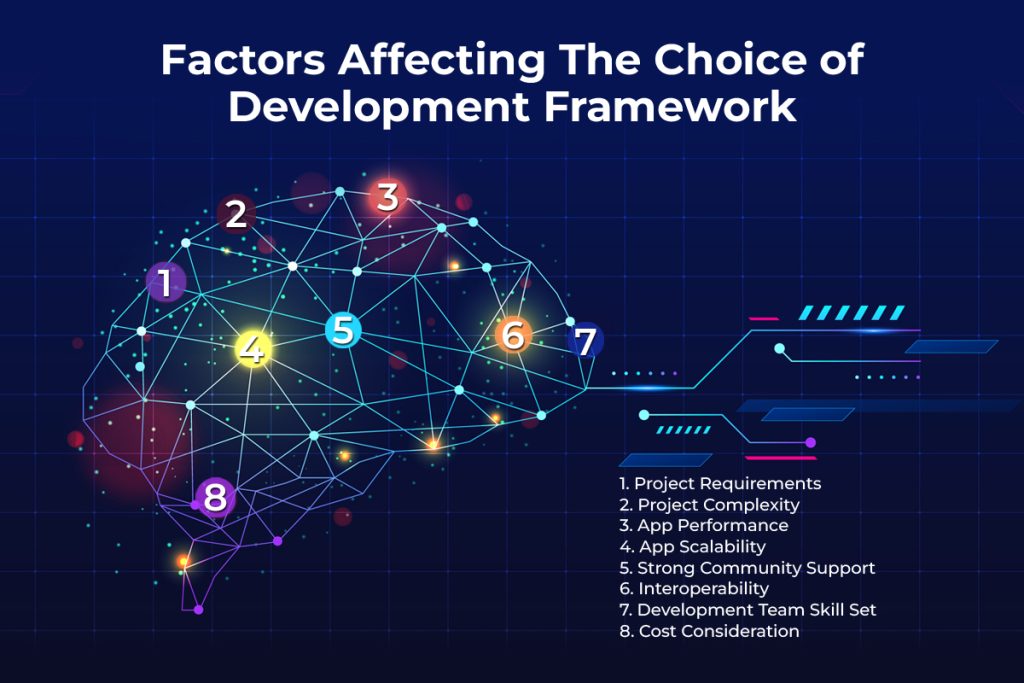Home » Blog » Mobile App » Top Mobile App Development Framework 2024
Top Mobile App Development Framework 2024

As 2024 is starting off, there has been a lot of anticipation and buzz around the trending app languages and frameworks.
Which framework is best for mobile app development?
What would be the ranking of the trending frameworks?
Would the app developers need to shift to another framework and whatnot!
Well, the ever-evolving digital landscape calls for this debate. Dedicated mobile apps are extremely important for maintaining an effective online presence. The year 2024 looks like a very promising year for the rise of mobile app development. The dynamic digital ecosystem demands highly functional mobile apps to claim a high spot in the business competition. This blog is dedicated to identifying and exploring the trending mobile app development frameworks for 2024.
What Is A Mobile App Development Framework?
Mobile app frameworks are basically the building blocks that serve as a foundation of a mobile app structure. These frameworks empower app developers to create efficient mobile apps that are rich in visuals. The app frameworks accelerate the app development process by providing a set of prewritten codes, UI components, and tools. There are different app frameworks based on the platform for which the app is to be developed.
- Native Frameworks
- Hybrid Frameworks
- Cross-Platform Frameworks
Every framework is designed to cater to different app preferences. The target audience, platform compatibility, performance considerations, and app responsiveness are some of the factors that influence the choice of the mobile app framework.
Popular Mobile App Development Frameworks
The availability of a number of different app development frameworks allows the developers to choose any toolkit based on their preferences. Here is an overview of the features of commonly used app frameworks. These details will help you evaluate which framework is best for mobile app development.
React Native
This framework is developed and maintained by Facebook. It enables the development of applications with a single codebase. React Native has an active community and strong developer support.
Pros
- Open-source framework for building cross-platform mobile applications
- Strong support due to extensive community
- Code reusability
- Hot-reloading features
- Third-party plugins support
Cons
- Limited access to native APIs compared to native development
- Performance may not match native applications
Languages
- JavaScript
- React
Flutter
Flutter is one of the most popular development frameworks developed and maintained by Google. It is a cross-platform framework that offers a rich set of customizable widgets. Does Flutter have the potential to be the top trending framework in 2024, find out here the Flutter in mobile app development
Pros
- High-performance app framework
- Customizable set of widgets
- Single codebase across platforms
- Hot-reloading feature
Cons
- Smaller community as compared to React Native
- Limited third-party libraries
Language
- Dart
Ionic
Built on standard web technologies, ionic leverages web views for cross-platform compatibility and features a vast library of pre-built UI components.
Pros
- Open-source framework
- Easy learning for developers
- Extensive library of pre-built UI components
Cons
- Comparatively low performance
- Limited access to native device features
Languages
- HTML
- CSS
- JavaScript
Xamarin
Xamarin is owned by Microsoft. It provides access to native APIs for utilizing platform-specific features.
Pros
- Full access to native APIs
- Code-sharing across platforms using Xamarin
- Integration with Visual Studio and Azure
Cons
- Requires developers to know C#
- Limited free features
Languages
- .NET
- C#
NativeScript
This framework provides direct access to the native APIs and allows the building of cross-platform applications.
Pros
- Full access to native APIs
- Code sharing between web and mobile
- Support for Angular
- Cross-platform code sharing
Cons
- Relatively small community compared to React Native and Flutter
- Limited third-party plugins
Language
- JavaScript
Factors Affecting The Choice of Development Framework
There are various deciding factors that come into play while choosing a mobile app framework. Selecting the right app framework is of paramount importance and it requires a thorough analysis of the technical requirements, project scope, and objectives. Here are some key factors that influence the choice of the mobile app framework.
Project Requirements
The first and foremost thing that affects the choice of a framework is your unique project requirements. Choose a framework that aligns with your project specifics. For that, you need to thoroughly understand your project first and list the major requirements. Go through the specifics of every framework and evaluate which app development structure works best for you.
Project Complexity
Consider the functionality of the app framework in comparison with the complexity of your project. Some development toolkits are better suited for simple app functionalities while others have robust features to handle complex app structures. Choose the development kit based on your project’s complexity.
App Performance
The page load time and performance speed are some of the most important factors affecting the user experience these days. It is important to take the required app speed into account while choosing the development kit. Consider the performance of the app in correspondence to the required app speed. Some app toolkits are better suited for high-performance applications while others work well for basic app functioning.
App Scalability
Projects are a work of progress. New features and updates are continuously added to the app according to the user’s requirements. So it’s important to choose an app toolkit that allows the integration of new features and updates effectively. The framework should scale with the project to keep the app relevant for a long time to come.
Strong Community Support
Mobile app toolkits have dedicated community and app support resources that make the framework reliable. An active and large community indicates easy access to support resources and app plugins. A healthy framework ecosystem is also beneficial to get help when you are stuck somewhere in the code.
Interoperability
The mobile apps need to be integrated with third-party tools and services sometimes. The chosen framework should allow easy integration of other systems and technologies for streamlined functionality. The project may also require the app to be functional across different platforms. You will need to develop hybrid apps for this purpose. Frameworks with cross platform functionality are required for hybrid app development.
Development Team Skill Set
It is also imperative to consider the skills of the developers who are working on the project at hand. Different app frameworks feature different programming languages. To work with a new development toolkit, the developers need to be familiar with the framework. Therefore, familiarity with a mobile development toolkit will help project execution in minimal time.
Cost Consideration
Note that some frameworks require proper licensing for which you have to buy the rights. Make sure to evaluate the cost of using the framework, developers’ expertise, and project requirements to see if it is worth investing in.
Get The Best Mobile App Development Services!
The selection of the right mobile app toolkit makes app development simpler and more effective. From evaluating the project requirements to understanding the future of the project, the strategic decision requires careful consideration of the key factors. Every framework has different structure and coding requirements. So it’s important that you have the relevant resources to work with the selected toolkit. Suave Solutions is a one-stop-shop-all software services provider. With a track record of hundreds of successful projects and a global clientele, we provide superior software development services. Our skilled mobile app developers uphold professional expertise in designing apps using different development toolkits. Partner with Suave Solutions for app development services projects and stay ahead of the competition!
Frequently Asked Questions
Which framework is used to develop mobile apps?
React Native, Flutter, and Xamarin are typically used for developing mobile apps.
How do I choose the best mobile app development framework?
Consider your project requirements, app performance needs, development team expertise, framework ecosystem, and project scalability to select the right framework for your app.
Is React Native better than Flutter?
Choosing between the two depends on your project requirements. React Native is popular for its extensive community while Flutter is known for its rich set of customizable widgets.
Recent Posts
- The Future of Software Engineering by 2030 October 13, 2025
- How AI Chatbots Boost Customer Support & CSAT September 1, 2025
- Top Software Development Companies 2025: Choose the Right Partner August 8, 2025
- Healthcare Software Development Services: What to Expect in 2025 July 17, 2025
- How To Hire Software Developers For Your Startup June 27, 2025
Categories
- Business Solutions (12)
- Digital Marketing (2)
- E-Commerce (3)
- Mobile App (11)
- Software Developers (21)
- Software Teams (15)
- Team Outsourcing (14)
- Tech Trends (10)
- UI UX Design (4)
- Web Development (8)


